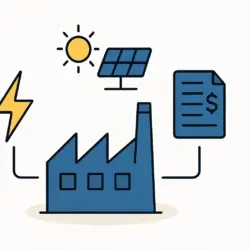Thailand is poised to become a leader in solar energy with its new “Solar for All” initiative, a program leveraging abundant sunshine to revolutionize the country’s energy landscape. Spearheaded by the Energy Policy and Planning Office (EPPO), this Thailand solar rooftop program is designed to expand solar power generation and deliver affordable, sustainable energy nationwide.
How the “Solar for All” Initiative Works
The “Solar for All” initiative is a government-backed program that encourages households to install rooftop solar panels by offering financial incentives. Homeowners can benefit from reduced electricity bills and even sell excess power back to the grid.
The initiative not only addresses rising electricity demand but also aligns with Thailand’s climate goals, which target a 30% reduction in greenhouse gas emissions by 2030. For more information about Thailand’s solar market expansion, visit Thailand solar market Expansion: 7 Amazing Developments in 2023.
Thailand’s solar capacity has already grown significantly, reaching 4.5 GW in 2022. The “Solar for All” program aims to boost this capacity by an additional 1 GW—enough to power over 800,000 homes. To support this goal, the EPPO has allocated 20 billion baht (approximately $600 million) to fund subsidies of up to 50% for solar panel installations.
Economic Growth and Community Benefits
The “Solar for All” program does more than reduce reliance on fossil fuels—it also promotes energy independence and generates significant economic benefits, especially through new jobs. According to the International Renewable Energy Agency (IRENA), Thailand’s renewable energy sector could create 500,000 new jobs by 2030. To support this growth, the EPPO has also partnered with financial institutions to offer low-interest loans, making solar panel investments more accessible.
Environmental Impact and Energy Security
As a clean and renewable resource, solar energy significantly cuts greenhouse gas emissions. This expansion alone could reduce Thailand’s carbon emissions by an estimated 1.5 million tons annually, contributing to global climate goals and strengthening national energy security. The “Solar for All” program also encourages decentralized energy generation, reducing the risk of power shortages and blackouts. For updates on solar power quota increases, check out Thailand solar power Quota Increased to 400 MW Annually for 2024.
Future Prospects for Solar Energy in Thailand
The “Solar for All” initiative is a major step toward Thailand’s goal of sourcing 30% of its energy from renewables by 2036. The EPPO plans to expand the program to commercial and industrial sectors, further driving the transition to a low-carbon economy. Thailand’s long-term strategy also includes exploring innovative technologies like floating solar farms and solar-powered electric vehicles.
Thailand’s Leadership in Southeast Asia’s Solar Transition
With its ambitious “Solar for All” initiative, Thailand is leading Southeast Asia’s renewable energy transition. The program strengthens energy security and economic growth while helping meet global climate goals. By continuing to invest in solar energy, Thailand is setting a powerful example for other nations, showing how renewable power can transform economies and protect the environment for future generations. For more on related solar news in Thailand, visit the Thailand Solar News Archives.



